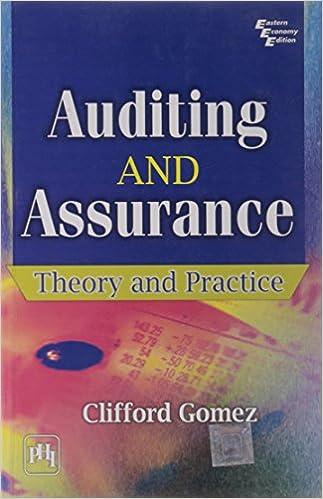Question
This page has an explanation of calculating present value. When you are ready to solve the problem, click the Problem tab at the bottom of
This page has an explanation of calculating present value. When you are ready to solve the problem, click the Problem tab at the bottom of the spreadsheet. In this final week, we have one problem using the effective interest rate method. In order to use this, we need to calculate time value of money. There are three ways to go about this:
1. Use a table that is an appendix in most accounting books and is easily found by conducting an Internet search for "amortization tables."
2. Use a mathematical formula.
3. Use an Excel present value formula.
Let's assume we want the present value of $5,000, which we will receive six months from now, assuming an 8% interest rate. We know that the present value will be less than $5,000. Using a table: You can find a "present value of a lump sum" table by going to principlesofaccounting.com and clicking "supplements" at the bottom-left of the screen. "Time value of money" will be one of the supplements listed. You will use the table called "Present Value of $1." Because we are interested in a payment six months from now, we will have to divide the interest rate by 2 to represent a half-year. Looking at 4% for 1 period, we get a factor of .96154. Multiply the $5,000 by this factor. $4,807.70 Using a mathematical formula: Here, the formula will be the principal amount (1 plus the interest rate) to the power of the time period. In Excel, the math symbol for "to the power of" is ^ The interest rate is the full 8% and the time period is 0.5 years. When we want present value, we will enter the power of as negative because we are discounting the principal amount backwards. If we were calculating future value, the time period would be positive. Formula is 5000*(1+.08 )^0.5 $4,811.25 Notice this comes out slightly different. This is because some calculations use 360 days and some use 365. We can mostly correct for this by multiplying the period by 365 and dividing by 360. Formula is 5000*(1+.08 )^(0.5*365 360) $4,808.68 Using the Excel formula: The present value formula is =PV(rate, periods, amount) The rate must be divided by 2 because it is a half-year. You will get a negative answer as a result because the formula is used to ask, "What amount do I need to invest now (negative cash flow) to get a certain amount in the future?" =PV(.08 2,1,5000) ($4,807.69) If you are preparing a spreadsheet and you need the number to display as positive, simply put a negative in front of the amount in the formula =PV(.08 2,1,-5000) $4,807.69
PROBLEM: District Water Company issued 10-year bonds with a face value of $100,000 and a stated interest rate of 8.0%. The bonds are dated April 1, 2016, and call for semiannual interest payments on each April 1 and October 1. Due to market fluctuations, the bonds actually sold to yield 10.0% per year.
1. Compute the amount received for the bonds.
2. Compute the first interest and amortization amounts for the October 1, 2016, payment.
3. Prepare journal entries for the issuance of the bonds and for the first interest payment.
4. Compute the second interest and amortization amounts for the April 1, 2017, payment.
Step by Step Solution
There are 3 Steps involved in it
Step: 1

Get Instant Access to Expert-Tailored Solutions
See step-by-step solutions with expert insights and AI powered tools for academic success
Step: 2

Step: 3

Ace Your Homework with AI
Get the answers you need in no time with our AI-driven, step-by-step assistance
Get Started


